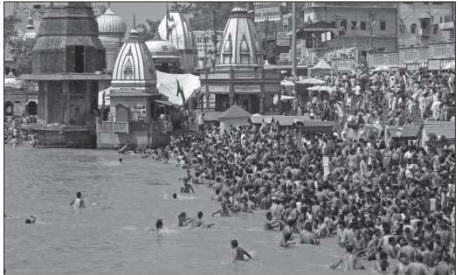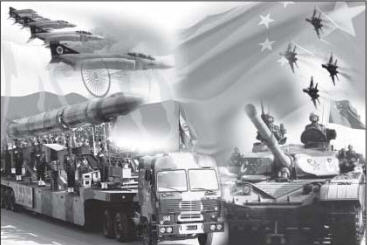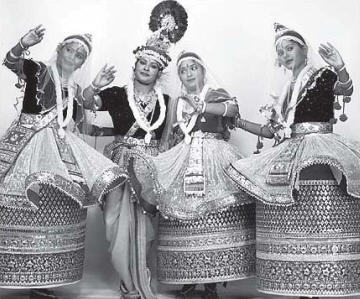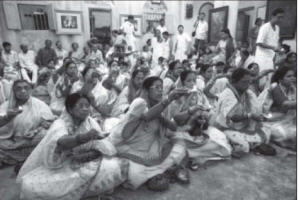Bharatavarsa is not an ordinary country.
It is punya-bhumi where Bhagavan comes.
Srila Prabhupada, Lecture, Bhuvanesvara, January 22, 1977)
Kumbha-Mela

By culture, by birth, the land of Bharatavarsa is punya-bhumi. You will still find millions of people coming to take bath in the Kumbha-mela to take a dip into the Ganges because they think it is pious. So the spiritual fluid is flowing through the veins of Indians. Unfortunately the leaders are misguiding them, and they are becoming atheists generally. It is a very regretful situation. (Lecture in Delhi, November 13, 1973)
In India the yogis, the transcendentalists or the devotees, all leave home and reside in sacred places such as Prayaga, Mathura, Vrindavana, Hrishikesa and Hardwar (see below). In solitude, they practice yoga where the sacred rivers like the Yamuna and the Ganges flow. But often this is not possible, especially for Westerners. The so-called yoga societies in big cities may be successful in earning material benefit, but they are not at all suitable for the actual practice of yoga. (Bhag. 6.11-12)
Anyone who has land in India, at least, any poor man has a certain amount of land can utilize that for Krishna by growing flowers to offer Him.
Mother Ganga
As cities are constructed in the modern age with great engineering and architectural craftsmanship, so in days gone by there were neighborhoods called rishi-kulas, where great saintly persons resided. In India there are still many magnificent places for spiritual understanding; there are many rsis and saintly persons living in nice cottages on the banks of the Ganges and Yamuna for purposes of spiritual cultivation. (Bhag. 3.22.26)
In India, one can actually see that a person who takes a bath in the Ganges waters daily is almost free from all kinds of diseases. A very respectable brahmana in Calcutta never took a doctor’s medicine. Even though he sometimes felt sick, he would not accept medicine from the physician but would simply drink Ganges water, and he was always cured within a very short time. The glories of Ganges water are known to Indians and to ourselves also. The River Ganges flows by Calcutta. Sometimes within the water there are many stools and other dirty things which are washed away from neighboring mills and factories, but still thousands of men take bath in the Ganges water, and they are very healthy as well as spiritually inclined. That is the effect of Ganges water. The Ganges is glorified because it emanates from the toes of the lotus feet of the Lord. Similarly, if one takes to the service of the lotus feet of the Lord, or takes to Krishna consciousness, he is immediately cleansed of the many dirty things which have accumulated in his innumerable births.
China

While preparing this commentary on this particular stanza of Srimad-Bhagavatam we have a crisis before us. Our neighboring friend China has attacked the border of India with a militaristic spirit. We have practically no business in the political field, yet we see that previously there were both China and India, and they both lived peacefully for centuries without ill feeling. The reason is that they lived those days in an atmosphere of God consciousness, and every country, over the surface of the world, was God-fearing, pure-hearted and simple, and there was no question of political diplomacy. There is no cause of quarrel between the two countries China and India over land which is not very suitable for habitation, and certainly there is no cause for fighting on this issue. But due to the age of quarrel, Kali, which we have discussed, there is always a chance of quarrel on slight provocation. This is due not to the issue in question, but to the polluted atmosphere of this age: systematically there is propaganda by a section of people to stop glorification of the name and fame of the Supreme Lord. Therefore, there is a great need for disseminating the message of Srimad-Bhagavatam all over the world. It is the duty of every responsible Indian to broadcast the transcendental message of Srimad-Bhagavatam throughout the world to do the super most good as well as to bring about the desired peace in the world. Because India has failed in her duty by neglecting this responsible work, there is so much quarrel and trouble all over the world. We are confident that if the transcendental message of Srimad-Bhagavatam is received only by the leading men of the world, certainly there will be a change of heart, and naturally the people in general will follow them.
Dramatic Performances

Even one hundred years ago in India, all dramatic performances were centered around the superhuman activities of the Supreme Lord. The common people would be verily entertained by the performances of dramas, and yatra parties played wonderfully on the superhuman activities of the Lord. Thus even the illiterate agriculturist would be a participant in the knowledge of Vedic literature, despite a considerable lack of academic qualifications. Therefore, expert players in drama, dancers, singers, speakers, etc., are required for the spiritual enlightenment of the common man. The genealogists would give account completely of the descendants of a particular family. Even at the present moment the guides in the pilgrimage sites of India submit a complete account of genealogical tables before a newcomer. This wonderful act sometimes attracts more customers to receive such important information. (Bhag. 1.11.20)
Rama-rajya
In India the people hanker after rama-rajya because the Personality of Godhead was the ideal king, and all other kings or emperors in India controlled the destiny of the world for the prosperity of every living being who took birth on the earth. (Bhag. 1.12.4)
Duty of The State
… [A]n irresponsible life is adopted by the people in the age of Kali because of a sinful desire to condemn brahminical culture, God consciousness and cow protection, for which the state is responsible. The state must employ revenue to advance these three items and thus educate the populace to prepare for death. The state which does so is the real welfare state. The state of India should better follow the examples of Maharaja Parikshit, the ideal executive head, than to imitate other materialistic states which have no idea of the kingdom of Godhead, the ultimate goal of human life. Deterioration of the ideals of Indian civilization has brought about the deterioration of civic life, not only in India but also abroad. (Bhag. 1.19.4)
In India, kshatriya kings are still called singh, which means “lion.” Unless rogues, thieves and other demoniac people in a state are afraid of the executive head, who rules the kingdom with a strong hand, there cannot be peace or prosperity in the state. (Bhag. 4.16.23)
Seeing the Lord

To see the Lord is a great festive occasion undoubtedly, as was considered by the metropolitan ladies of Dvaraka. This is still followed by the devout ladies of India. Especially during the days of the Jhulana and Janmastami ceremonies, the ladies of India still throng up in the greatest number at the temple of the Lord, where His transcendental eternal form is worshiped. (Bhag. 1.11.24)
Krishna Dolls for Kids
Maharaja Parikshit also used to play with Krishna dolls in his childhood. In India the children in good families are still given dolls of the Lord like Rama and Krishna, or sometimes the demigods, so that they may develop the aptitude of service to the Lord. By the grace of the Lord we were given the same opportunity by our parents, and the beginning of our life was based on this principle. (Bhag. 3.2.2)
Music For The Lord
It is stated here that early in the morning musicians used to sing with musical instruments about the glories of the Lord. The Emperor, with his family, personally used to hear about the pastimes of the Supreme Person. This custom is still prevalent in India in some royal families and temples. Professional musicians sing with Sahnais, and the sleeping members of the house gradually get up from their beds in a pleasing atmosphere. Even at bedtime, the singers sing songs in relation to the pastimes of the Lord, with Sahnais accompaniment, and the householders gradually fall asleep remembering the glories of the Lord. In every house, in addition to the singing program, there is an arrangement for Bhagavatam lectures in the evening; family members sit down, hold Hare Krishna kirtana, hear narrations from Srimad-Bhagavatam and Bhagavad-gita and enjoy music before going to bed. The atmosphere created by this sankirtana movement lives in their hearts, and while sleeping they also dream of the singing and glorification of the Lord. In such a way, perfection of Krishna consciousness can be attained.
City planning
Before the reign of King Prithu there was no planned arrangement for different cities, villages, pasturing grounds, etc. Everything was scattered, and everyone constructed his residential quarters according to his own convenience. However, since King Prithu plans were made for towns and villages. (Bhag. 4.18.32)
Purport
From this statement it appears that town and city planning is not new but has been existing since the time of King Prithu. In India we can see regular planning methods evident in very old cities. In Srimad-Bhagavatam there are many descriptions of such ancient cities. Even five thousand years ago, Lord Krishna’s capital, Dvaraka, was well planned, and similar other cities Mathura and Hastinapura (now New Delhi) were also well planned. Thus the planning of cities and towns is not a modern innovation but was existing in bygone ages.
